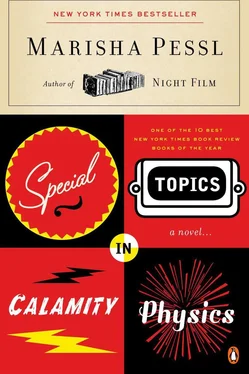My hands were cold. I walked over to the yellow couch in front of the windows and sat down.
“It’s not all finished with Hannah Schneider,” I said. “You have blood here.” I showed him.
“You got me, huh,” he said sheepishly, touching his face. “Was it the Bible or An American Tragedy ? I’d like to know for symbolic purposes.”
“There’s more about Hannah Schneider.”
“I might need stitches.”
“Her real name was Catherine Baker. She was an old member of The Nightwatchmen. She murdered a policeman.”
My words were like a ghost passing through Dad; not that I’d ever seen a ghost passing through a person, but his face drained of color — fell out of him like water poured from a bucket. He stared at me, expressionless.
“I’m not kidding,” I said. “And if you want to confess something about your own involvement, recruiting or — or murder or blowing up one of your capitalist Harvard colleagues, you’d better do it right now, because I’m going to know everything. I won’t stop.” The resolve in my voice surprised Dad, but especially me; it was as if my voice was stronger than I was. It threw itself onto the ground, leading the way like slabs of stone.
Dad was squinting. He looked as if, suddenly, he had no idea who I was. “But they never existed,” he said slowly. “Not for thirty years. They’re a fairy tale.”
“Not necessarily. It’s all over the Internet that—”
“Oh, the In ternet,” Dad interrupted. “As powerful a source as they come. If we open that gate, we must also usher in Elvis, still alive and kicking, popup ads — I don’t understand why you’re bringing up The Nightwatchmen. You’ve been reading my old lectures, Federal Forum —?”
“The founder, George Gracey, is still alive. He lives in Paxos. A man named Smoke Harvey drowned in Hannah’s swimming pool last fall and he’d tracked him down and—”
“Of course,” Dad nodded, “I remember her whining about it — obviously yet another reason why she went bananas.”
“No,” I said. “She killed him. Because he was researching a book about Gracey. He was going to expose him. All of them. The entire organization.”
Dad raised his eyebrows. “Well, you’ve obviously done quite a bit of work figuring this out. Go on.”
I hesitated; Burt Towelson wrote in Guerrilla Girls (1986) to preserve the purity of any investigation one had to be vigilant about whom one spoke to concerning the scary truths that had emerged; but then, if I couldn’t trust Dad, I couldn’t trust anyone. He was staring at me as he’d stared at me a thousand times before, whenever we moseyed through my thesis for an upcoming research paper (his expression interested but doubtful he’d be wowed) and so it seemed an inevitable thing to walk him through my theory, My Grand Scheme of Things. I began with Hannah plotting her own exit because of what Ada Harvey knew, how she left me L’Avventura , “The Flying Demoiselle,” the costume party, a version of Connault Helig’s elimination technique employed to murder Smoke, Hannah’s history of the Bluebloods paralleling Catherine Baker’s history, her preoccupation with Missing Persons and, finally, my telephone conversation with Ada Harvey. In the beginning, Dad stared at me as if I were a lunatic, but as I went on, he began to hang on my every word. In fact, I hadn’t seen Dad this engrossed since he obtained a newsstand copy of the June 1999 issue of The New Republic , in which his lengthy satiric response to an article entitled “Little Shop of Horrors: A History of Afghanistan” had been printed in the Letters section.
When I finished, I expected him to hurl questions at me, but he remained thoughtfully silent for a minute, maybe two.
He frowned. “So who killed poor Miss Schneider?”
Naturally, Dad would have to ask the one question I had only a rickety-bridge answer to. Ada Harvey had said she thought Hannah had committed suicide, but since I’d heard that stranger bounding through the trees, I tended to think someone in Nächtlich had done it; Hannah had been a liability when she’d killed the State Trooper, and with Ada telephoning the FBI and the possibility of her capture, Gracey, the entire group’s clandestine existence was at risk. But I didn’t know any of this for certain, and as Dad said, one should never “dribble speculation like a leaky garbage bag.”
“Well, I’m not sure, exactly,” I said.
He nodded and said nothing more.
“Have you written about Nächtlich recently?” I asked.
He shook his head. “No. Why?”
“Remember the way we met Hannah Schneider — she was in Fat Kat Foods and then she reappeared at the shoe store?”
“Yes,” he said, after a moment.
“Ada Harvey described the same thing when she told me how Hannah met her father. She’d planned the whole encounter. So I was worried maybe you were her next victim, because you were writing something—”
“Sweet,” Dad interjected, “as flattered as I’d be for Miss Baker to choose me as her target — never been anyone’s target before — there is no Nightwatchmen, not any longer. They’re considered by even the most laid-back of political theorists to be a mere fantasy. And what are fantasies? What we use to pillow ourselves against the world. Our world, it’s a cruel parquet— murder to sleep on. Besides, this isn’t the age of revolutionaries, but an age of isolationaries. Man’s proclivity today is not to unite, but to cut himself off from others, step on them, grab as much dough as he can. As you know too, history is cyclical and we’re not due for another uprising — even a silent one — for another two hundred years. More to the point, I remember reading an in-depth piece about Catherine Baker being a Parisian gypsy in origin, so however thrilling it may sound, it’s still rather tenuous to assert Schneider and Baker were the same woman. Given the odd way she told all of this to you, how do you know she didn’t simply read a book, a real page - turner about the mysterious Catherine Baker, then let her imagination run wild? Maybe she wanted you to believe, for every one to believe before she killed herself, that that had been her life, a life of upheaval and causes — she, Bonnie, some other dope, Clyde. That way she might live forever, n’est-ce pas? She’d leave behind a thrilling Life Story, not the dreary editorial that was her truth. Such are the lies people tell. And they’re a dime a dozen.”
“But what about the way she met Smoke—?”
“All we know for certain is that she liked to pick up men in food settings, ” Dad said with authority. “She was looking for love amidst frozen peas.”
I stared at him. He did have a few infinitesimal points. On www.iron butterfly.net the author claimed Catherine Baker had been a French gypsy. And given the heaving-bodice posters in Hannah’s classroom, I could conceive how it was some what plausible she might devise a more exciting life for herself. Just like that, Dad could poke serious holes in my rowboat theory, make it look embarrassingly overdesigned and ill considered (see “De Lorean DMC-12,” Capitalist Blunders , Glover, 1988).
“So I’m nuts,” I said.
“I didn’t say that,” he said sharply. “Certainly, your little theory is elaborate. Far-fetched? Absolutely. But it is, in a word, remarkable. And rather exciting. Nothing like news of silent revolutionaries to get the blood rushing into one’s head—”
“You believe me?”
He paused and turned his face up to the ceiling to consider this, as only Dad could consider things.
Читать дальше












